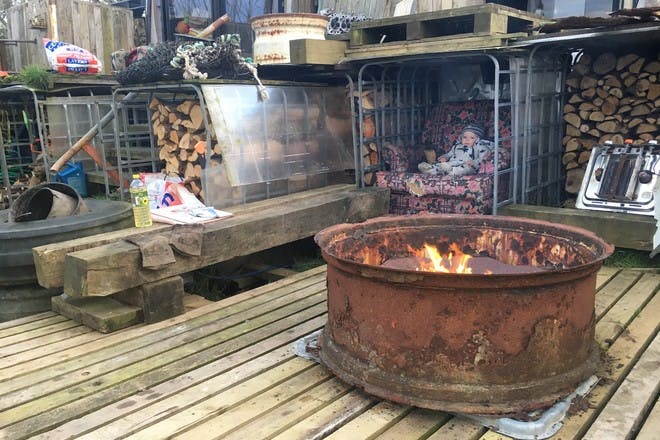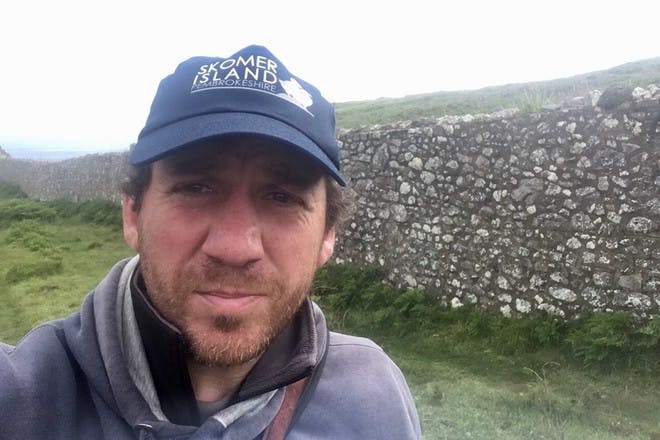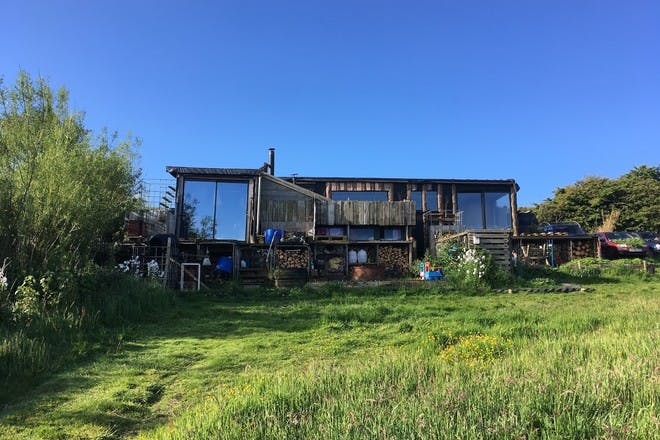Netmums Voices: 'What it’s like to bring up your family off-grid'
Matthew Watkinson is a former vet who lives in North Pembrokeshire with his wife Charis, their two children, Billy, 1 and Elsa, 10, a lot of chickens, some ducks, several feral beehives, lots of wildlife and one uncoordinated cat called Wobbly.
This page contains affiliate links, which means we may earn a small amount of money if a reader clicks through and makes a purchase. All our articles and reviews are written independently by the Netmums editorial team.
I doubt we’d have children if we hadn’t moved to Wales and bought a piece of land.
Charis was keen, but I couldn’t see past the looming ecological apocalypse, or my desperation to avoid being trapped in a job I didn’t want to do, to fund a mortgage I really didn’t want, to provide stability for kids I didn’t think had much of a future left.
I was adamant that kids would be a bad idea so we made plans without them: plans to find a patch of land that could provide food and energy, and help wean us off the supermarkets and utility companies we’d become so completely dependent upon.
In 2011, we stopped planning it and actually started doing it.

Taking the leap
I initially wanted to move to the middle of Iceland or the outer reaches of the Outer Hebrides, but that was a bit too remote for Charis so we settled on North Pembrokeshire.
We’d visited before and knew it was beautiful, so we found a little plot of land with water and space, and bought it. We were terrified, but we did it anyway.
Our original plan was just to visit in the holidays, but a few months later its pull had become so strong we quit our jobs, packed everything we had into an old camper van and drove to Wales to live nearby (in a normal house).
We were poor but free and, as our relationship with our little patch of land developed, so did our hope for the future and my feelings about a family.
It was then that we found out about Wales’ unique One Planet Development planning policy and a debt-free, self-reliant, outdoor, nature-based, family-friendly life became such a possibility that it felt stupid not to.
This policy allows people to build and live in open countryside if they are prepared to commit to a low-impact lifestyle, which we were.
There are a lot of criteria and targets involved, so while we got to grips with being parents, and caring for our newborn daughter Elsa, we also wrote a long and detailed management plan outlining exactly how we were going to satisfy them all. We were granted planning permission to live on our land on the 20th July 2016, five years to the day after we bought it.

Going off-grid
Having secured permission, we dragged an old horse lorry up the hill, ripped out the horse partitions to create a temporary living space, installed a wood-burning stove and some solar panels, moved out of our rented cottage and moved in to our new ‘home’.
Our kitchen was a plank of wood, our toilet was a plastic trunk, our water supply was a mountain stream, our fridge was a metal bin outside and the camper van we used to escape our former life was now our bedroom.
It was really challenging, but in an exciting, adventurous way and we have never looked back. Ever.
And neither has Elsa. To be fair, she was only two when we moved off-grid so she hadn’t really known much else, but it was still a big change.
The first night was the worst. All established routines collapsed and we felt completely destabilised.
We didn’t really know how we were going to do anything we’d previously taken for granted. We didn’t even know how we were going to give her a bath.
I was utterly convinced she’d never sleep again.
I sat outside her bedroom for three hours after she’d gone to bed before I finally accepted that the wind wasn’t actually terrifying her and she had, in fact, gone straight to sleep.
Now I think about it, it’s quite clear that she coped with the move way better than we did. Our anxiety went into orbit while she took it all in her stride.
She’s still using the half barrel we eventually used to solve the baby bath crisis, and she’s still loving it.
And so is Billy.
I don’t think he’s ever had a normal bath in his life and I doubt he could care less about that fact. As soon as I start filling the barrel he’s there trying to clamber in over the side, fully clothed, as normal.
Living off-grid with a newborn
Billy was born mid-winter in December 2017.
Just getting him from the hospital to the house was difficult.
A winter storm had made the track more treacherous than a water slide, so I had to abandon the car half way up and run through the wind and rain with Billy tucked in my coat like the world’s most precious rugby ball.
We don’t have central heating so our bedroom can get pretty cold sometimes. We’d heard stories about well-wrapped Eskimo babies sleeping outside, so we adapted – he spent his first few months going to bed in clothes more typically associated with skiing than sleeping.
Five babygros and a ski suit did make changing his nappy in the middle of the night a complete pain, but he was cosy and happy and, most importantly, he slept well (for a newborn baby, anyway).

A new kind of normal
Other than that, the kids both lead pretty normal lives.
Elsa attends the local school and is now almost fluent in Welsh. Billy will go there too, when he’s big enough – and has stopped cuddling the chickens.
We haven’t got round to building the straw bale house we have permission for, so we still live in our temporary accommodation.
But the horse lorry has now been joined by a couple of big agricultural trailers and, after three years of tinkering, it doesn’t really look or feel like we’re living in a collection of scrap vehicles anymore.
It feels like a home.
Solar panels supply enough electricity for a TV and DVD player, internet router, laptop, lights, mobile phones and a fridge freezer (in the summer) and, when the batteries run low because we haven’t seen the sun for a while, we just end up reading books by the fire, which is absolutely lovely.
We cook using wood or gas, an increasing amount of which we produce ourselves from our kitchen waste using a home-made bio-digester.
Cooking this way is different, but we’re now pretty good at cooking pizza inside a wood-burning stove or freshly-picked raspberry crumble in a biogas oven.
The kids’ diet is a bit different and getting more so, but we’re committed to growing as much of our own food as possible and they seem to be happy eating nasturtium leaf salads, wild garlic pesto and runner beans by the bucket load.
They definitely both love homemade nettle cordial way more than supermarket squash, that’s for sure.
Composting toilets are perhaps the biggest difference for them compared to a normal house, but it’s a small thing really and it definitely doesn’t bother them at this stage.
Maybe when they’re teenagers they’ll find it a bit embarrassing, but when that happens I’m going to blame society for being too squeamish.
Elsa and Billy probably take our lifestyle for granted. We know they’re more active and spend more time outdoors than many children, but they don’t.
We know that we’re more stable parents because we’re both present (most of the time) and able to work as a team (most of the time), but they don’t.
They have no idea how different life could be if we were working furiously and separately to support a house, mortgage and family.
Whether we’re doing enough to prepare them for the environmental challenges we all face remains to be seen. They’ll probably end up living in skyscrapers and driving Humvees.
Either way, Charis and I are sure that living off-grid has given us both the desire and the ability to raise a family and we have the same number of regrets as we have normal toilets. Or bath tubs.
If I could tell another parent considering living off-grid three things, they would be …
1. Being a parent living off-grid has taught me the value of time and teamwork when it comes to running a house and raising a family.
2. There are a million reasons not to follow your dream, but are any of them really worth it?
3. Moving off-grid is an adventure you can’t fully prepare for. As Ray Bradbury once said: 'sometimes you have to ‘jump off the cliff and build your wings on the way down.’
What I’ve learnt about being a parent living off-grid
The adventure might fail, like many challenging adventures do, but even if it does you’ll have a lot of funny stories to tell.
The parents like me that inspire me are ...
Bushmen parents, or parents from any hunter-gatherer tribe.
We still believe it takes a village to raise a child, especially a village that values nature and community over money and possessions, and though modern life has made that impossible for us, we’re doing as much as we can to replicate those conditions.
Do you practise off-grid parenting? How do you feel about Matthew's parenting story? Join in the chat below and read other parents' experiences ...
Related stories
CHAT: Would you ever consider off-grid parenting?
Netmums Voices – Jo Middleton: Why I’m reclaiming ‘single parent’ as a badge of honour

Reduce your family’s carbon footprint from the comfort of your kitchen by making a simple swap to Quorn Mince or Pieces.
Every bite, every meal and every plate counts, so join the movement and share photos of your family’s meat-free meals on social media with the hashtags #Quorn #OneBiteAtATime.
Visit Quorn to find out more and check out our delicious meat-free recipes for inspiration.





